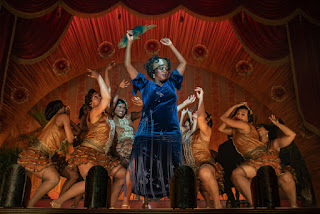Movie Review - Ma Rainey's Black Bottom
Africans-Americans moved northward or westward in order to get away from the Jim Crow south and the racial segregation and discrimination, particularly the poor economic conditions that kept them down. They went northward to pursue more opportunities and better jobs. In effect, that's what Ma Rainey did. She was born in Georgia. She then went to Chicago to record her songs and make more money. Pulitzer Prize and Tony Award-winner, August Wilson wrote the 1984 play on which this film is based. The play focuses on one day in the life of Ma Rainey, the day that she and her band left Georgia and came to Chicago to record her songs and start making better money. Adapted by actor-turned-writer Ruben Santiago-Hudson (Lackawanna Blues) and directed by Tony Award-winner, George C. Wolfe (The Immortal Life of Henrietta Lacks and Lackawanna Blues), this film brings to life the play that had its revival in 2003 on Broadway.
Viola Davis (Fences and How To Get Away With Murder) stars as Ma Rainey, a blues singer who has a very large presence on stage. She's very sultry and very voluptuous. She can be very seductive in front of an audience. She can be quite lurid on stage as well. This comes out of her vaudeville background, which embraced burlesque shows where women would wear all kinds of makeup or they would strip and reveal skin, peaking out of large feathers and fanning certain parts with those feathers. Ma Rainey didn't strip, but she makes provocative moves like bending over and squatting low to accentuate her "black bottom" as it were. She would pucker her lips and sing her lyrics as if she's kissing each word, gyrating as if she's making love to the crowd.However, there is this other part to her. There are various other parts to her in fact. One such part is that she's a diva or she's become one as a result of the experiences Black people had in the Jim Crow era. She has a bit of power, her voice, her songs and her act, which has been successful. Music companies and the white men who work for those companies want to exploit that and sell it, or essentially sell her songs, to make a fortune. That's leverage that Ma Rainey knows she has, so she uses that leverage as power, power to get what she wants and not take any backtalk from anybody. She rules and she knows it. Yet, she knows this power is fleeting. Once the white men get what they want from her, they'll toss her aside, which is something we saw happen to Eddie Murphy's character in Dreamgirls (2006).
His most standout moment is when he describes a very traumatic moment of racial violence that occurred in his family. Boseman is incredible as he has to deliver a very wrenching monologue that is about five minutes or more. Speaking of dominance and control, he dominates and controls that scene and those five minutes or more. There's no way that anyone watching it won't be enrapt. He's also heartbreaking and tear-jerking in a very powerful way. It's through him that we get the pain and rage that African-Americans suffered and carry with them, often through their whole lives. Boseman and Davis both give very heavy and sweaty performances that are worthy of all the accolades that can be thrown at them.
However, there is levity and humor here. Wilson's dialogue is sharp and snappy. There's also a lot of comedy to it. The scenario overall is a bit humorous. The push-and-pull of the men in this recording studio trying to get Ma Rainey to lay down her voice is a literal tug-of-war that has the men have to bend to her will and submit to her demands. Whether it's getting her car fixed, getting her an ice-cold Coca Cola or allowing her stuttering nephew, Sylvester, played by Dusan Brown, on the record, there's a lot of good comedy here. It's also good that the film maintains Ma Rainey's same-sex attraction and the lesbian part of her to be expressed. Speaking of which, shout-out to Colman Domingo (Selma and 42) who plays Cutler, the guitar player and de facto bandleader.This film is one of several plays or Broadway musicals to be adapted into a film this year or within the past year. The Two Popes (2019) was one that people liked. Cats (2019) was one that was highly derided. Ryan Murphy either produced or directed a couple, including The Boys in the Band (2020) and The Prom (2020). We're not done this year. Regina King's One Night in Miami (2020) is soon on its way. I'll be curious to see King's film, but this one is the best play adaptation that we've gotten in two years and possibly longer, really since Fences (2016), which was the previous August Wilson play to get the film treatment.
Rated R for language, sexual content and brief violence.
Running Time: 1 hr. and 33 mins.
Available on Netflix.














Comments
Post a Comment